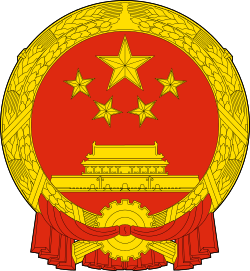United Front (People's Republic of China)
 |
| This article is part of a series on the politics and government of China |
|
|
The United Front in the People's Republic of China is a popular front of the legally permitted parties in the country, led by the Communist Party of China. Besides the CPC, it includes eight minor parties and the All-China Federation of Industry and Commerce. It is managed by the United Front Work Department (Chinese: 中共中央统战部) of the Central Committee of the Communist Party of China. Its current department head is Sun Chunlan.
Overview
The United Front is represented together with other mass organizations such as trade unions, women's and youth organizations, minorities etc. in the Chinese People's Political Consultative Conference.
The United Front holds no real power independent of the CPC; it exists mainly to keep up the appearance that the People's Republic is a pluralist society.[1] Its leaders are mostly selected by the Communist Party of China, or are themselves CPC members.[2] The member parties which exist are almost completely subservient to the CPC and must accept its "leading role" as a condition of their continued existence. Thus, China is a de facto one-party state. However, the United Front parties have nominal representation in the National People's Congress.
United Front Democratic Parties
- In the official order of precedence:
- Revolutionary Committee of the Kuomintang (中国国民党革命委员会 Zhōngguó Guómíndǎng Gémìngwěiyuánhuì)
- China Democratic League (中国民主同盟 Zhōngguó Mínzhǔ Tóngméng)
- China Democratic National Construction Association (中国民主建国会 Zhōngguó Mínzhǔ Jiànguó Huì)
- China Association for Promoting Democracy (中国民主促进会 Zhōngguó Mínzhǔ Cùjìnhuì)
- Chinese Peasants' and Workers' Democratic Party (中国农工民主党 Zhōngguó Nónggōng Mínzhǔdǎng)
- China Party for Public Interest (中国致公党 Zhōngguó Zhìgōngdǎng)
- September 3 Society (九三学社 Jǐusān Xuéshè)
- Taiwan Democratic Self-Government League (台湾民主自治同盟 Táiwān Mínzhǔ Zìzhì Tóngméng)
All-China Federation of Industry and Commerce
- All-China Federation of Industry and Commerce (Zhonghua Quanguo Gongshangye Lianhehui)
See also
- Chinese People's Political Consultative Conference; 2006 CPPCC
- List of political parties in the People's Republic of China
- One country, two systems
- United Front Doctrine
References
- ↑ New Approaches to the Study of Political Order in China, by Donald Clarke, Modern China, 2009
- ↑ Judicial politics as state-building, Zhu, Suli, Pp. 23–36 in Stéphanie Balme and Michael W. Dowdle (eds.), Building Constitutionalism in China.New York: Palgrave Macmillan.
External links
Further reading
- James D. Seymour (1987), China's Satellite Parties, Routledge, ISBN 978-0873324120